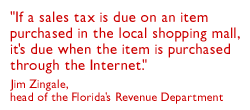|
States fight back on e-taxes
|
 |
April 21, 2000: 11:35 a.m. ET
Local governments plan to press firms for taxes on Web transactions
By Staff Writer Steve Bills
|
NEW YORK (CNNfn) - Moratorium, schmoratorium. State and local governments, undeterred by federal attempts to declare the Internet a tax-free zone, are redoubling their efforts to reap revenue from e-commerce.
The state of Florida, for one, has been forthright in putting its residents on notice about its intentions.
"If a sales tax is due on an item purchased in the local shopping mall, it's due when the item is purchased through the Internet," Jim Zingale, head of the state's Revenue Department, wrote in a "guest editorial" that has been published in several Florida newspapers. "Under state law, the only difference is who collects and sends in the tax."
Other officials feel the same way. Tennessee Gov. Don Sundquist, for instance, has warned he would be forced to cut basic services unless the state collects sales taxes from Internet-based transactions.
Efforts target businesses
As a practical matter, the "revenooers" are not likely to come knocking at your door for the few pennies that might be due on some book or music CD you bought from an online merchant.
 But if you are a business that just ordered half a million bucks worth of servers for your Web farm, the taxman just might find it worthwhile to pay you a little social call. But if you are a business that just ordered half a million bucks worth of servers for your Web farm, the taxman just might find it worthwhile to pay you a little social call.
"Most states that enforce sales tax laws don't audit individuals," acknowledged Dave Bruns, a spokesman for the Florida Revenue Department. "On the other hand, we audit businesses all the time. We audit businesses on a routine basis."
Why is it that the tax collector puts the crosshairs on the business community rather than on consumers? For the same reason that Willie Sutton robbed banks: Because that's where the money is.
For all the fuss about consumer-oriented electronic commerce, an estimated 75 percent to 80 percent of all Web transactions are business-to-business, Bruns said.
Not only are the dollar amounts larger, but states already have the machinery in place to track tax avoidance by business. As described by "E-Commerce Tax Alert," a new monthly newsletter from publisher CCH Inc., states are using old-fashioned information exchanges to trace new-fangled Internet transactions.
Establishing a 'nexus'
In the case of that computer deal, the out-of-state seller is not obligated to collect tax on the sale because it has no "nexus" -- no physical presence -- in Florida, where the buyer is. And if the goods are shipped via UPS, they may elude the state's manifest-tracking system that monitors commercial freight.
But if the auditors in the seller's state find that the shipment to Florida meets a certain threshold, then the information is forwarded to the state DOR under an existing agreement, and the buyer will receive either a tax bill or a visit from an auditor, the newsletter reports.
 If this seems surprising because you thought the Internet Tax Freedom Act imposed a moratorium on Internet taxation, guess what. "It's a very misunderstood piece of legislation," said Karl Frieden, a partner in Arthur Andersen's state and local tax practice. At its heart, the law only prevents discriminatory taxation that would penalize Web transactions. If this seems surprising because you thought the Internet Tax Freedom Act imposed a moratorium on Internet taxation, guess what. "It's a very misunderstood piece of legislation," said Karl Frieden, a partner in Arthur Andersen's state and local tax practice. At its heart, the law only prevents discriminatory taxation that would penalize Web transactions.
Indeed, when the federal Advisory Commission on Electronic Commerce delivered its report to Congress last week, most of its recommendations failed to carry the two-thirds majority support required under the panel's rules -- precisely because the federal appointees and business representatives, with their free-market orientation, could not come to terms with those representing tax-hungry state and local interests.
"They reached such a stalemate that they couldn't reach a supermajority on any of the major issues," Frieden said. As it was, the report largely carried the weight of a "majority report," he said, but without the formal support that backers of reform had sought.
In some ways, this was frustrating, considering this is the "biggest issue in taxation in the last 50 years," said Frieden, author of the book, "CyberTaxation: The Taxation of e-Commerce."
Legislation in the hopper
Even the limited report of the commission has inspired some legislation -- a Senate bill was introduced last week to create certain "safe harbors" for Internet transactions, so that, for instance, using Web servers within a given state wouldn't create a nexus for tax purposes.
Still, the murky boundaries between a Web business and the physical world are likely to cause conflicts for the foreseeable future. Should an interstate Web transaction be exempt from state sales tax if the seller also has a physical store in the state? Some retailers are setting up their Internet businesses as separate companies just to avoid this nexus. But what happens then, if the company accepts returns of Web-ordered merchandise at its mall store?
Frieden acknowledged the difficulties. "Even if government and business could reach a consensus, it would take a lot of experimentation," he said. "It's hard to apply a 20th century tax system to the 21st century economy."
Nor does he expect an early resolution, predicting it will take three to five years to establish rules for Internet taxation. In the meantime, "there's going to be an escalation of conflict between government and business." 
|
|
|
|
|
 |

|

